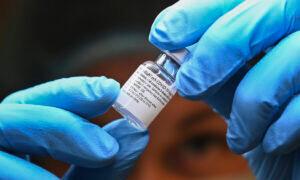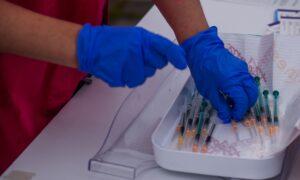Study Finds Higher Incidence of COVID-19 Among Consistent Mask Wearers
Some mask wearers were found to have up to 40 percent higher incidence of infection, contradicting earlier studies and opposing the narrative of mask mandates.
People who wore masks were found to be more likely to contract COVID-19 infection than those who did not, according to a recent Norwegian study.
Among individuals who “never or almost never” wore masks, 8.6 percent tested positive, which rose to 15 percent among participants who “sometimes” used masks, and to 15.1 percent among those who “almost always or always” wore them.
Adjusting for factors like vaccination status, the study determined that individuals who “sometimes/often” wore masks had a 33 percent higher incidence of COVID-19 compared to those who “never or almost never” wore masks. This jumped to 40 percent among people who “almost always/always” wore them.
However, adjusting for “differences in baseline risk over time,” the risk of wearing masks turned out to be “less pronounced” with only a 4 percent higher incidence of infection among mask wearers.
“The results contradict earlier randomized and non-randomized studies of the effectiveness of mask-wearing on the risk of infection,” the researchers wrote.
“Most of these studies reported that wearing a face mask reduces the risk of COVID-19 infection. Some observational studies have reported manyfold reductions while one community-based randomized trial failed to demonstrate a statistically significant reduction in infection risk and one cluster randomized community trial found only a modest reduction.”
The researchers pointed out a major limitation of their study—individuals who used masks could have been more likely to wearing masks to protect others from their own infection. This could explain the “positive association between risk of infection and mask usage.”
Behavioral differences and the fact that the survey was based on self-reporting could also contribute to bias, it stated.
There is also a possibility that mask wearers felt safe while wearing masks and thus did not follow other regulations like social distancing, which raised their risk of contracting COVID-19, the study said.
“Our findings suggest that wearing a face mask may be associated with an increased risk of infection. However, it is important to note that this association may be due to unobservable and non-adjustable differences between those wearing and not wearing a mask,” the researchers concluded.
“Therefore, caution is imperative when interpreting the results from this and other observational studies on the relationship between mask-wearing and infection risk. Recommendations to wear face masks in the community are largely informed by low certainty evidence from observational studies.”
Researchers called for more trials and studies to gain a better understanding about the effectiveness of wearing masks against transmission of respiratory pathogens.
The study was fully funded by the Norwegian Institute of Public Health. It reported no conflicts of interest.
Masking Mandates
The new study comes at a time when some regions in North America are reinstating mask mandates amid a reported increase in COVID-19 cases.
In the state of California, San Francisco, Alameda, Santa Clara, San Mateo, Marin, Contra Costa, Napa, Sonoma, and Solano issued masking mandates, with the rules remaining in effect until next March or April.
While in some places only staff and workers of a healthcare facility are required to wear masks, others require patients and visitors to wear masks as well.
A month earlier, school officials with the Kinterbish Junior High School in Cuba, Alabama, asked students, employees, and visitors to wear masks “due to the slow raise of COVID cases in the area.”
Florida Health Officer and Surgeon General Joseph Ladapo highlighted the issue of ineffectiveness of masking policies.
“What do you call re-imposing mask policies that have been proven ineffective or restarting lockdowns that are known to cause harm? You don’t call it sanity,” he said in a post on X. “These terrible policies only work with your cooperation. How about refusing to participate.”
In an interview with the Brownstone Institution in February, Tom Jefferson, a senior associate tutor at the University of Oxford and lead author of the study, pointed out that there hasn’t been a “proper trial” of masks where a huge, randomized study was done to check their effectiveness. Instead, some experts overnight began to perpetuate a “fear-demic.”






